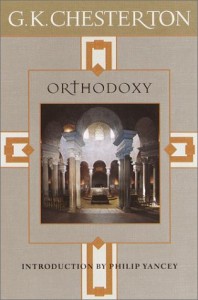Orthodoxy
 I finished Chesterton’s autobiographical book Orthodoxy a few days ago. I loved it and will probably read it again.
I finished Chesterton’s autobiographical book Orthodoxy a few days ago. I loved it and will probably read it again.
We’ve all seen Chesterton quotes floating around here and there, and they’re always pithy and witty. I admit that at times I found his writing wearying for that very reason: it’s relentlessly epigrammatic. I learned to set the book aside when my mind clenched into a single spasm of simultaneous hard thinking and laughter, and my eyes glazed over.
Chesterton wrote this book in response to a challenge. It’s a sequel to Heretics, which I have not read, but which points out fallacies in various arguments against Christianity. Someone remarked that Chesterton would be more worth listening to on the negatives if he advanced an alternative — an affirmation of what to believe. Hence, Orthodoxy: The Romance of Faith, in which he offers not metaphysics, but rather his personal journey toward faith, and his reasons for turning to Christianity.
His perspective is truly unique. I remember someone telling me years ago that once I read Chesterton, C.S. Lewis would appear less original to me. I think that person may be right. Chesterton’s is a penetrating intellect, but one bursting at all times with something more rollicking and merry even than the witty C.S. Lewis. He is delighted to be writing, delighted to be arguing, delighted with objections and delighted to answer them. There is an almost reckless joy that permeates the atmosphere of this book and sets it apart.
Which isn’t to say it’s not profound. It is. Essentially, the book lays out Chesterton’s own spiritual longings and intuitive understanding of the world, then shows how Christianity satisfies them. The satisfaction is not at a purely cerebral level. The subtitle says it well: this book lays out the romance of faith. There are some sections of apologetics, and an attentiveness to the rules of argument; it’s not a “personal” book in the sense of implying, “These are my feelings, and they need no defense.” But the view of knowledge is more complete than a purely rationalistic book could provide; feeling and intuition come across as valid kinds of knowledge complementary to the rational.
I’ve thought of this as my first full-length Chesterton book, but I keep forgetting that I’ve read The Man Who was Thursday. I think I liked this one better. If you’ve read it, or decide to read it, I’d love to know what you think.


